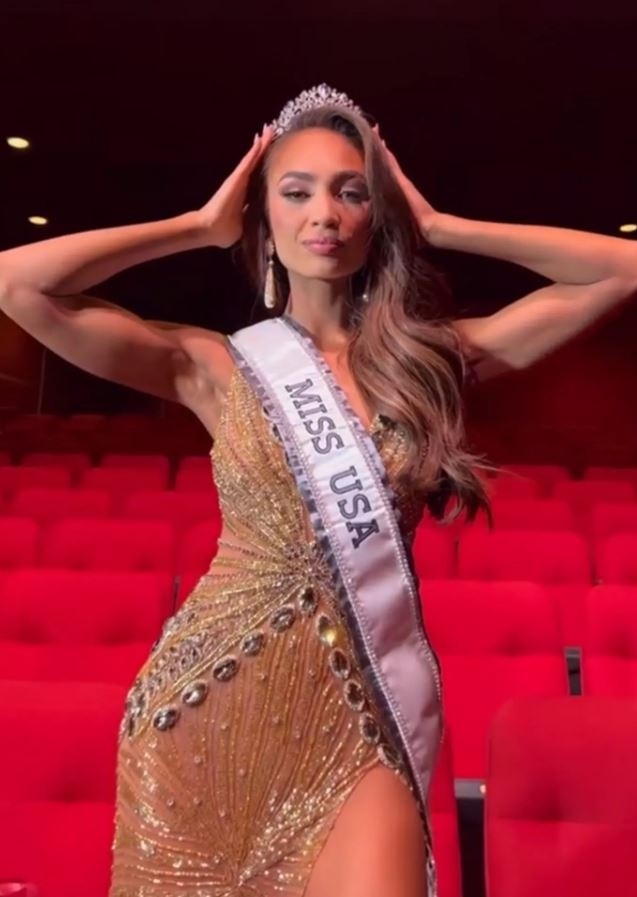Miss Universe, which debuted in 1952, makes the most audacious claim: that it can choose one woman to symbolize an idealized picture of femininity appropriate for the whole globe. Bonney Gabriel, Miss USA, was named the 71st Miss Universe on Saturday, defeating 82 competitors in a three-hour Mardi Gras-themed pageant in New Orleans.
By contemporary standards, the pursuit of a single aesthetic ideal seems archaic and unenlightened. This year, Miss Universe was disturbing for reasons beyond the objections one may have to scantily clothed young ladies being judged by purported experts in front of millions of viewers. This year, no amount of glitter could distract us from the darker realities hiding under the surface, including climate catastrophe, human rights violations, the suicide of Miss USA 2019 Cheslie Kryst in 2022, and Russia’s conflict in Ukraine.
The “National Costume Show,” conducted three days before the main pageant, was even stranger. Contestants donned clothes that floated between Surrealism, ethnic stereotyping, and Hollywood set design.
Miss Belize honored the rain forest and jaguar reserve of her country by adorning herself with trailing jungle foliage, a leopard-print leotard, and what seemed to be a small jaguar’s head fastened to her lower belly. Miss Indonesia resembled a ship at sea, and Miss Netherlands resembled a Stroopwafel. Miss Guatemala became a complete pyramid temple, while Miss USA recreated the 1969 NASA moon launch in a 30-pound outfit consisting of a metallic spacesuit-style leotard, lit headgear, and a 3-D representation of the moon suspended above her.
But all of this cheesy grandeur was not enough to deter the threat of conflict. Anna Linnikova, Miss Russia, brazenly donned a costume dubbed “The Crown of the Russian Empire,” which consisted of a pearl- and jewel-embossed satin mini dress topped with a crimson velvet cloak and a crown — a brazen billboard for Russian imperial aggressiveness.
Ms. Apanasenko channeled the archangel Michael, the patron saint of Kyiv, the capital of Ukraine, in counterpoint. Dressed as a “Warrior of Light,” she was spectacular in a gold unitard and halo, a floating white overdress, and stunning 16-foot feathered wings in the blue and yellow colors of her nation’s flag.
It was difficult to decide how to answer. Were we supposed to enjoy Stroopwafels and then bemoan the treasures of empire and the devastation of war? And did the three-day gap between the national costume display on Wednesday and the big event on Saturday let us forget the uneasiness that had been stoked?
In actuality, the dissonant character of Miss Universe 2023 was only an exaggerated version of the tension that surrounds every beauty contest. Such contests seek gravitas by interviewing women about international peace and domestic policy. However, it is difficult to transform a pageant into a lecture on world politics. In addition, it is difficult to transform women into abstract emblems of nationhood.
To some sense, all beauty pageants transform women into locations. Their sashes only bear the names of regions or cities, never their own. In the case of Miss Universe, however, each lady must represent an entire nation, a difficult undertaking. Historically, countries have referred to as “she” and regarded themselves as female characters. “Marianne” represents the noble republican ideals of France. The United States is home to Miss Liberty.
However, beauty contests complicate the woman-as-nation image. However brilliant or generous they may be, contestants are not there to symbolize moral ideals, remind us of hardship, or embody the spirit of a country. They are there to be enticing visuals and to provide programming that sells items.
And despite the emphasis on internationalism, this pageant, like all others, is a celebration of conformity. Almost every participant is a tall, slender, young lady with long legs, long hair, long eyelashes, flawless white teeth, and precisely sculpted features; they are all clad in skintight, incredibly exposing sequined costumes atop vertiginous stilettos. The outcome is less United Nations and more Rockettes.
Nonetheless, Miss Universe 2023 emphasized its cultural and ethnic diversity as proof of a new, progressive agenda. Anne Jakkaphong Jakrajutatip, a Thai millionaire, out trans woman, and chief executive officer of JKN Global Media, is the new and first female owner of Miss Universe.
In her Saturday address, Ms. Jakrajutatip compared the pageant to an updated version of Lilith Fair, declaring that it would now be “managed by women, owned by a trans woman, for all women across the globe to celebrate the strength of feminism!”
Ms. Jakrajutatip said in a press statement issued at the time of the transaction, “The worldwide reach of the Organization, its partnerships with global partners and brands, and its richness of content, licensing, and merchandising prospects make this a strategic addition to our portfolio.”
Purchasing Miss Universe is a commercial endeavor. This ultimately explains the peculiar tone of the spectacle. Beyond its promises of female solidarity, empowerment, and national pride, this is a massive branding opportunity for an ambitious, worldwide media platform, a commercial empire. And like with other empires, it requires a regal figurehead, such as an empress or queen.
The nostalgic regalism of a beauty pageant, with its prize of a jeweled crown, is the ideal vehicle for this 21st-century kind of monarchy. It is irrelevant if the contenders struggle to exemplify nationalism or express unselfish virtue while parading half-naked in heels. They are perfect manifestations, whether intentionally or not, of their sponsors’ values. They are more citizens of the global economy, with its standardized beauty norms and practices — our new cosmos — than they are of certain nations.

